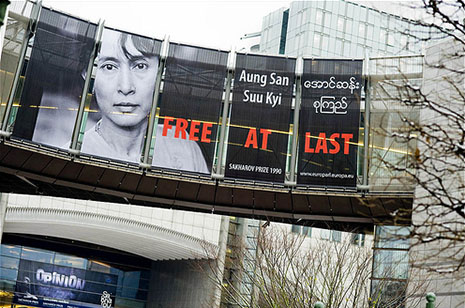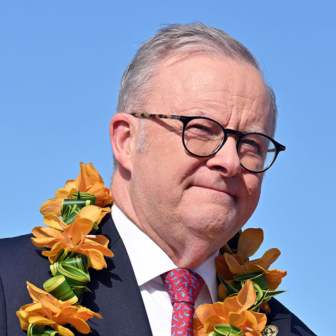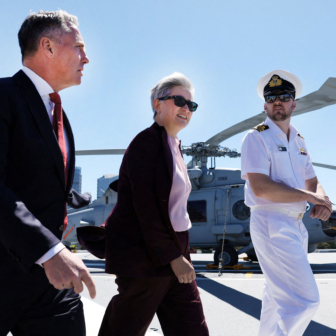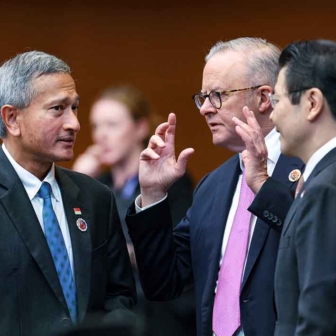EARLY in 2011 the penultimate step in Burma’s “seven-step roadmap to democracy” will see representatives take their seats in the country’s sixteen new parliaments – quite an increase for a country accustomed to being governed in secret by a small group of senior military officers. Three-quarters of these new political figures were elected in November, when the people of Burma went to the polls for the first time in two decades; the rest are military appointees.
Seeking to break the unwieldy stalemates of domestic politics, and also to curry favour ly, Burma’s military leadership has adopted a strategy that it hopes will enable its country to begin shaking off its pariah reputation. Fitting into the spectrum of ly palatable Southeast Asian semi-democracies – countries like Singapore, Thailand and Malaysia – is its long-term goal.
New faces will populate Burma’s constellation of national parliamentary institutions and regional assemblies. Active-duty and retired military officers will come out of the shadows to begin careers as parliamentarians, and a selection of elected entrepreneurs, ethnic leaders, technocrats and political fixers will also find themselves part of the new political reality. Overseeing it all will be the ruling clique, headed by Senior General Than Shwe.
For the military, and particularly for its most senior officers, stable government will remain the supreme concern. The new system, based around the 2008 constitution, was designed to preserve the military’s security and prosperity. Long-term strategising and horse-trading mean that too much has been invested for senior officers to surrender control to untested civilian leaders.
One civilian leader who hasn’t found a seat in any of the new parliamentary institutions is Aung San Suu Kyi, Burma’s pro-democracy icon, who was released from her latest stint of house arrest immediately after the 2010 elections. Some have suggested that her release means that Than Shwe and his advisers no longer fear her ability to disrupt their carefully implemented plans. In time-honoured dictatorial fashion, the government stacked the deck, even going so far as to draft the 2008 constitution with clauses that exclude her, and other Burmese with strong links, from full political participation.
The fact that the country’s transition to semi-democratic politics was rigged has generated understandable resentment. Key democratic players, including Aung San Suu Kyi’s National League for Democracy, opted to boycott the recent polls so that their participation couldn’t be used to legitimise the military government’s electoral gambit.
Instead, many of Burma’s democrats find themselves confronted with a political landscape where old certainties have been replaced by a baffling array of contentious new challenges. Aung San Suu Kyi’s struggle to pull the country in more democratic directions now jostles for priority among a fresh configuration of parliamentary, ethnic and politics.
First of all, there are the new parliaments: two national assemblies (upper and lower houses) that will convene in Burma’s new capital, Naypyidaw, and fourteen regional assemblies, one for each of the ethnic-majority states and Burmese-majority regions. These new institutions, and the new political faces that will fill them, signal the military’s burgeoning confidence that it can maintain its grip on national politics.
A complex set of rules has been created to manage a system that they hope will convince the world that Burma is an acceptable “semi-democracy.” Obviously, we can’t ignore the fact that the electoral victory by the fledgling military-aligned Union Solidarity and Development Party means that the regime’s cronies will take many key positions across the country. Learning from their mistake when Aung San Suu Kyi’s National League for Democracy won the 1990 elections, this time around the senior military leadership left nothing to chance.
Burma’s new parliaments will be dominated by figures who, we assume, are regime loyalists, entirely sympathetic to ongoing military dominance. This is a fair expectation, and it may well be that in the months ahead the complete control exerted by the military leadership through its civilian proxies will become apparent.
But there is also a chance that the new political institutions will provide opportunities for greater independence than we might imagine. Debates, at least within the Union Solidarity and Development Party if not more broadly in parliament, will test the capacity of the military elite to dominate all policy areas. Some new parliamentarians are already seeking out novel ways of gaining a public profile, and the participation of so many new faces suggests we are likely to see experimentation that confounds the standard stories about Burma’s politics.
Among the hundreds of unsuccessful parliamentary candidates from democratic and ethnic parties many lessons will have been learned. Even in defeat, the election campaign catapulted a number of future leaders to prominence. The day-to-day frustrations of the 2010 campaign, compounded by the onerous and expensive nomination process implemented by the authorities, will not extinguish their democratic instincts.
Even more importantly, Aung San Suu Kyi is now able to speak directly to the world, and to a lesser extent to the Burmese people, about her ideas and aspirations. Along with regular interviews for the and Burmese media she has embraced other technologies to get her message out – video link-ups, for instance, including to a crowded lecture theatre at the London School of Economics – and is reportedly weighing up the pros and cons of Twitter versus Facebook.
After so many years of dislocation and frustration, the people of Burma, and the community, now enjoy opportunities to hear from her with unprecedented speed and clarity, though there is an ongoing risk that she could be incarcerated for any perceived missteps.
For Burma’s rulers, Aung San Suu Kyi still distracts attention from what they hope will be a smooth transition into the ranks of Southeast Asia’s other semi-democracies. Ominously, the Burmese government anticipates that she will ultimately capitulate in the same manner as many of their other opponents who have faded from political life.
THE carefully managed stalemate has also been a feature of the way the Burmese government has managed the complex and potentially violent mix of ethnic groups within its borders over the past quarter of a century.
Since the late 1980s the country’s military rulers have manoeuvred over a dozen major ethnic armies into ceasefire agreements, most of which have held reasonably steady. Lucrative business opportunities, particularly in border areas, have encouraged ongoing collaboration with Burma’s military. The logic of these ceasefire deals is that the protection of wealth and assets militates against resumed hostilities.
Over the past two years, though, pressure to abandon the agreements has built within some ethnic armies. Some of these groups quietly question their complicity in the government’s undemocratic policies. Government negotiators have failed to convince the two largest ethnic armies, the United Wa State Army and the Kachin Independence Army, that their best option is to become government-controlled Border Guard Forces.
These ethnic armies have called for a resumption of peace talks and the implementation of a federated and fully democratic political system within which minority rights can be defended. Between them, the Kachin and Wa armies can marshal tens of thousands of fighters; any resumption of hostilities with the government would drastically change the national political mood.
Right now, fighting along the border with Thailand – where the Karen National Union has consistently resisted government efforts to force a ceasefire agreement – has the potential to shake the government. Violence has been almost constant in the mountains along this border for over sixty years.
Over the past year some armed groups that supported the Burmese government have switched sides and started attacking their erstwhile allies. Their disloyalty has been met with fearsome retaliation. Waves of villagers have fled to safety in Thailand as all sides prepare for what could be a long and bloody campaign.
At the same time, the dimension to Burma’s political and ethnic stalemates is changing quickly. While boycotts and sanctions have made stronger links between Western democracies and Burma impossible, a wide range of other countries have opportunistically compensated. Among a long list of other investors and collaborators, countries like Singapore, Thailand, China and India – and, further afield, Russia, North Korea and Israel – have sought to become enmeshed in Burma’s economy.
One of the disadvantages of sanctions rhetoric is that we tend to ignore just how limited and symbolic Western policies have become. If we are hoping to change Burma’s behaviour, then our efforts to blacklist key government figures, ban their travel to the West and discourage economic links have failed. Instead, there has been a range of unintended impacts. Sanctions have left plenty of room for businesses with no scruples about human rights or democracy. Does the average Chinese dam builder really care if Burmese army units use rape as a weapon of war? Are Singaporean hoteliers uncomfortable with more-or-less permanent military rule? Would an Israeli arms manufacturer ask too many hard questions?
The indignation voiced from Washington, London and Canberra ignores the vibrancy of economic and personal connections that Burma now has with other countries, particularly its near neighbours. In every case, their investments and connections benefit from the lack of American, British and Australian competition or involvement.
The conundrum for Aung San Suu Kyi and her supporters is that the military government has proven almost completely impervious to Western opprobrium, and is now well-positioned to move beyond Burma’s political and ethnic stalemates. The parliaments that they have built, and the ethnic wars that they are fighting, are products of a system where Western commitment has been constrained.
And critical jabs from Western idealists, insisting on immediate steps to a “pure” democracy, have only served to bolster the government’s resolve. A military leadership that sees its own history in terms of resistance to colonial subjugation and defiance in the face of internal and external threats will habitually seek out mechanisms for even greater control.
The current mechanism of choice is the semi-democratic 2008 constitution. It is steeped in the rhetoric of a government that sees itself as the liberator and guardian of a society under threat. Part of the unheralded success of Burma’s military regime is that perceived threats to the government’s survival are immediately, even naturally, described as threats to everyone. The conflation of military rule with national integrity and sovereignty has proven a potent recipe.
But as a government that has faced down decades-long insurgencies, crushed popular street uprisings and weathered condemnation it has clearly developed a fresh appetite for moving beyond the prevailing stalemates. Generating a degree of legitimacy through the new parliamentary institutions and further neutering the capacities of the ethnic armies are the two highest priorities. It helps that instincts to criticise will be tempered by Aung San Suu Kyi’s release from house arrest.
What we now need to acknowledge is that the military leadership has crafted a political and economic system that will likely endure well after elections are regularised. Their anticipation is that our lack of attention to Burma ensures that the military and its civilian proxies will be quietly encouraged to continue ruling the country.
This means that in 2011 we will see a new stalemate between Aung San Suu Kyi’s democratic forces and this semi-democratic system. Anyone who seeks to challenge the military and its rule will want to test whether anything has changed. It is still far too early to hope that much extra room for compromise and conciliation will be available. •




